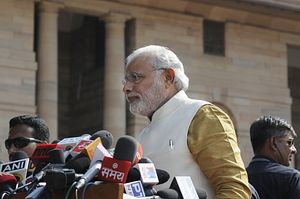To say that yesterday was a bad day for India’s ruling Bharatiya Janata Party (BJP) would be a massive understatement. Suffering losses in by-elections in several states, the BJP failed to win even a single seat in areas where it had dominated just last year. On top of that, the first anti-BJP front emerged, with six splinter socialist groups coming together under one banner. They hope to dampen the BJP’s clout.
The by-elections are another testament to the BJP’s failure to consolidate its gains since its decisive victory in general elections last year. In the hilly state of Uttarakhand, the BJP won all five parliamentary seats in 2014, only to lose them in three subsequent by-elections. Similarly in Uttar Pradesh, the largest province in India, where the ruling party won 71 out of 80 seats last year, the BJP has failed to win in any local elections. Those losses have raised fears that the party will not be prepared for assembly elections due by next October.
The regional alliance of Northern and Eastern socialist parties is a bigger worry for the BJP. The merger of the six splinter groups, called the Janata Parivar, poses a major threat to the ruling party in crucial states such as Bihar and Uttar Pradesh. Among the parties that will be folded into Janata Parivar are the Janata Dal (United) or JD(U) and the Rashtriya Janata Dal (RJD) of Bihar. The JD(U) is a ruling party and the RJD was in power for 15 years until 2005.
In 2014, the JD(U) and RJD went it alone against the BJP, which ultimately won 31 out of Bihar’s 40 parliamentary seats. The BJP-led alliance won more than 45 percent of the vote. The regional parties matched that share of the vote in aggregate. That arithmetic is driving the JD(U) and RJD together.
The BJP’s rise poses an existential threat to Bihar’s regional parties, which have dominated state politics since 1989. They hope to contest elections under a single banner, teaming up with the downtrodden Congress party to stop Modi’s juggernaut. That formula could prove successful: in by-elections held in Bihar last August, the alliance won six out of ten seats up for grabs.
For the BJP, winning in Bihar is a matter of prestige. If it manages to wrest the state from the JD(U), it could regain the momentum it lost in the Delhi elections earlier this year. Bihar is a gateway to the east. A win there could have a domino effect in neighboring states like West Bengal, where the BJP has been investing heavily to take the assembly elections due next year. Success in Bihar could lead to windfall gains for the right-wing party. In 2017, Uttar Pradesh is also going to the polls.
But that grand plan, starting in Bihar, is easier said than done for the BJP.
The BJP won 31 percent of the vote in the 2014 elections, but came away with 282 out of 545 seats in parliament because it faced a divided opposition. After Modi’s first year in office, the opposition is more vocal and active than before. With the power of the prime minister’s charisma waning, it will not be easy for the ruling party to repeat last year’s performance.
In the lower house of parliament, these six parties that make up the Janata Parivar: the Samajwadi Janata Party, the JD(U), the RJD, the Indian National Lok Dal, the Janata Dal (Secular), and the Samajwadi Janata Party. Together, they have a combined strength of 15 members. In the upper house, they command 30 members, making them the third largest party after the Congress and the BJP, which have 68 and 47 members respectively. The BJP will find it difficult to conduct legislative business as the minority in the upper house. The emergence of the Janata Parivar will make it much harder for the ruling alliance to muster support for crucial legislation.
For the Congress party, the new group is a double-edged sword. On one hand, it helps Congress consolidate anti-Modi sentiment and the secular vote. On the other hand, the new grouping restricts Congress’ expansion. Congress Party leader Rahul Gandhi wants to contest elections alone in states like Bihar, but the regional coalition will force the party to seek allies to defeat the BJP.
Still, the new front faces many challenges, especially distrust between regional leaders. Before joining hands, the JD(U) and RDU were bitter political rivals for nearly 15 years. It will be not be easy for them to make compromises.

































